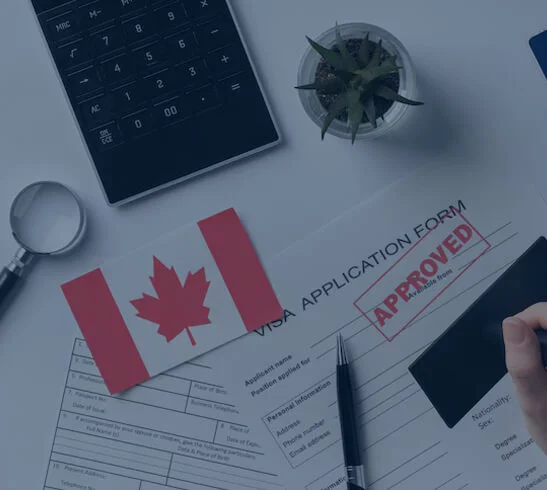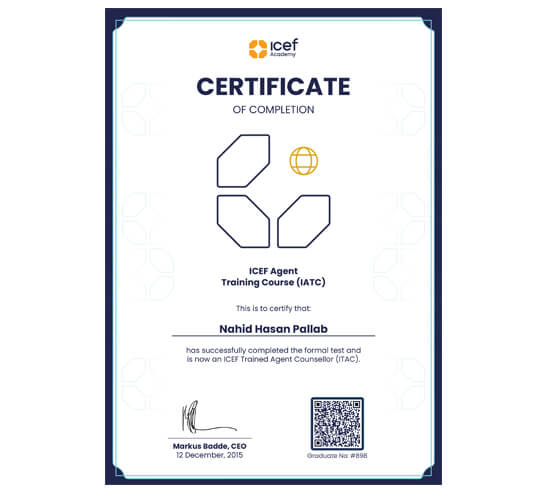CONTACT INFO
152/2A-2, Rowshan Tower, 2nd Floor, West Panthapath, North Dhanmondi, Dhaka - 1205, Bangladesh
info@nhpeducationconsultants.com
Sat to Thu, 11 am to 8 pm
We are open: Sat - Thu: 11 am - 8 pm
Dreaming of studying in Canada? NHP guides Bangladeshi students with admissions, scholarships, and visa support to achieve their study abroad goals.
Most students choose Canada for its quality universities and cost-effective education. Ranked among the top three OECD countries, Canada is also recognized as the best country to live in worldwide.
Canada offers one of the world’s top education systems, with high academic standards and innovative programs across all fields. Whether you prefer large, vibrant campuses or small, close-knit colleges, you'll find quality education in English or French. Canadian institutions are leaders in research and technology, and their graduates are highly sought after - even by top USA employers.
Canada leads the OECD in education investment, delivering top-quality learning experiences. A Canadian degree or diploma is recognized worldwide, opening doors to global career opportunities. With academic excellence and competitive programs, Canada is your gateway to a bright, successful future.
Canada is consistently ranked as one of the safest countries in the world, with low crime rates and welcoming, inclusive communities. Campuses across the country prioritize student safety through well-equipped facilities, support services, and a strong sense of community. International students can feel secure and supported as they focus on their studies and personal growth.
International students in Canada can work up to 20 hours per week during academic sessions and full-time during scheduled breaks. Many programs include paid co-op terms, offering hands-on industry experience. After graduation, students may be eligible for a Post-Graduation Work Permit (PGWP), allowing them to gain valuable work experience in Canada for up to three years.
Canada offers clear immigration pathways for international students, making it easier to transition from study to permanent residency. Programs like the Post-Graduation Work Permit (PGWP) and Express Entry open doors to long-term opportunities. With supportive policies and high demand for skilled graduates, Canada is an ideal place to build your future.
Valid Passport
All educational Certificates & Transcripts
References/Letters of Recommendation
Personal Statement
Proof of English Language Proficiency
CV or Resume (if applicable)
Other supporting documents (if available, e.g extracurricular activities)
Research Proposal (for PhD or some MRes applications)
A valid Passport
A valid LOA (Letter of Acceptance) from a DLI
A valid PAL (Provincial Attestation Letter)
Confirmation of any scholarship, grant, teaching or research assistantship
Study Plan
Proof of English Language Proficiency (if applicable)
All educational Certificates & Transcripts
CV or Resume (if applicable)
Police Clearance Certificate & Birth Certificate
Marriage Certificate (if applicable)
Parental or Legal Guardian Consent (if under 18)
Proof of Upfront Medical Exam
Affidavit of Financial Statements
Proof of Means of Financial Support (Bank Statements, Source of Income, Tax, etc)
Other supporting documents (if available, e.g extracurricular activities)
Completed Application Forms (IMM1294E, IMM5645E)
Appropriate Visa Application Fee - CAD $235
For a detailed visa application checklist, please consult with NHP Education Consultants counsellors.
Select a program: Select a course of study that sparks your interest and aligns with your academic goals.
Find a DLI: Choose a Designated Learning Institution (DLI) in Canada that offers your preferred program, ensuring it aligns with both your academic and career goals.
Review the academic and English language requirements (such as IELTS, PTE, or TOEFL scores) for your chosen course.
Gather documents:
Academic transcripts and certificates
English language test scores
Personal Statement
Letter(s) of Recommendation
Passport copy
CV/Resume (if required)
Submit your application to your chosen Designated Learning Institution (DLI) and pay the required application fee, which typically ranges from C$50 to C$350.
For undergraduate programs, applications are usually submitted through OUAC, ApplyAlberta, etc or through authorized representative such as NHP Education Consultants.
For postgraduate programs, apply directly through the university’s website or via authorized representatives such as NHP Education Consultants.
If your application is successful, you’ll receive either a Conditional Offer (requiring you to meet certain conditions) or an Unconditional Offer.
Once you meet all the conditions, pay your tuition deposit (if required) to secure your place.
After meeting the condition and pay the deposit (if required), you’ll receive a Provincial Attestation Letter (PAL) issued by the Provincial Government
Prepare essential documents, including your passport, LOA, PAL, Proof of Means of Financial Support, academic transcripts, language test scores (IELTS/TOEFL), Study Plan, PCC, Birth Certificate, etc.
Create an account on the IRCC website (GC Key or IRCC Portal), fill out the study permit application forms (IMM1294E, IMM5645E, etc), and upload all the required documents.
Submit the visa application fee (C$235 including Biometric Fee of C$85).
Schedule and attend a biometrics appointment at your nearest Visa Application Centre (VAC).
Complete a medical exam with an IRCC-approved panel physician if requested or if you haven’t done one prior to your application.
Track your application status online. Processing times vary depending on your country and application volume.
If approved, you will receive a Letter of Introduction (LOI) and a temporary resident visa (TRV).
Show your documents at the Canadian border to receive your official Study Permit upon entry.
NHP Education Consultants provides end-to-end support - from selecting the right university to securing your study permit visa. Get in touch today for personalized guidance!
There are only two ways to apply for a Study Permit Visa.
Apply Online through CIC website (GC Key)
Apply Online through IRCC Portal
We strongly recommend applying online through GC Key for more convenient visa application process.
Study Permit Application Fees
The current visa fee for a Study Permit application, including biometric and VFS service charges, is C$235.
Explore top Canadian programs for Bangladeshi students, including Business, Engineering, IT, and Health Sciences, and find the pathway to global career success.
Computer Science & IT
Biomedical Sciences
Physical Sciences
Environmental Science
Health Sciences
Pharmaceutical Sciences
Electrical Engineering
Civil Engineering
Mechanical Engineering
Chemical Engineering
Industrial Engineering
Aerospace Engineering
Business Management
Accounting & Finance
Business Economics
Marketing, IB, HRM
Events Management
Tourism Management
Law
Social Sciences
Psychology
Media and Communications
English Language
International Relations
Explore top Canadian universities favored by Bangladeshi students. Earn internationally recognized degrees that open doors to global career opportunities and lasting success.
University of Waterloo
University of Toronto
McMaster University
Queen’s University
University of Windsor
Western University
Toronto Metropolitan Uni
Brock University
York University
Trent University
Seneca Polytechnic
Centennial College
University of Manitoba
University of Winnipeg
University of Saskatchewan
University of Regina
University of Alberta
University of Calgary
McGill University
Dalhousie University
Carleton University
UPEI, PE
University of New Brunswick
Memorial University
Unlock your Canadian education with a variety of scholarships for Bangladeshi students, including Vanier Canada Graduate Scholarships, Ontario Graduate Scholarships (OGS), and merit-based awards offered by top universities for both undergraduate and graduate programs.
C$50,000/PY - up to 3 years
PhD or Combined Masters/PhD
Academic excellence, Research potential
June – September
No Support by NHP
C$15,000 per year
Graduate Programs
Academic excellence, Leadership, etc
October - December
No Support by NHP
Full Tuition & Living Expenses
Master’s & PhD (2 to 3 years)
Academic excellence, Research proposal, etc
August – December (varies)
No Support by NHP
C$2,000 to C$40,000
Bachelor (1 to 4 years)
Based on academic merit; varies by department
October - March
Support provided by NHP
Discover everything Bangladeshi students need to know about studying in Canada. This comprehensive guide covers each step, from selecting the right university and program to securing your student visa and preparing for a smooth arrival in Canada.

A valid Passport
A valid LOA (Letter of Acceptance) from a DLI
A valid PAL (Provincial Attestation Letter)
Confirmation of any scholarship, grant, teaching or research assistantship
Study Plan
Proof of English Language Proficiency (if applicable)
All educational Certificates & Transcripts
CV or Resume (if applicable)
Police Clearance Certificate & Birth Certificate
Marriage Certificate (if applicable)
Parental or Legal Guardian Consent (if under 18)
Proof of Upfront Medical Exam
Affidavit of Financial Statements
Proof of Means of Financial Support (Bank Statements, Source of Income, Tax, etc)
Other supporting documents (if available, e.g extracurricular activities)
Completed Application Forms (IMM1294E, IMM5645E)
Appropriate Visa Application Fee - CAD $235
As an authorized representative of numerous reputable Canadian universities, NHP is committed to guiding Bangladeshi students through every step of their journey. From selecting the ideal program and institution to securing scholarships, preparing documents, and obtaining a study permit, NHP provides personalized and dependable support to help you succeed in Canada. With unmatched experience and expertise, you won’t find a more knowledgeable consultants in Bangladesh than NHP.
The cost of studying in Canada varies based on the university, program, and location. Bangladeshi students should anticipate tuition fees ranging from CAD $16,500 to $120,000 per year, in addition to living and other related expenses.
For international students in Canada, undergraduate tuition fees usually fall between CAD $16,500 and $65,000 per year, whereas medical and graduate programs may reach up to CAD $120,000 annually.
| Type of Qualification | Duration | Cost in CAD/Per Year |
|---|---|---|
| Diploma/Adv. Diploma | 2 to 3 Years | C$16,500 to C$20,000 |
| Undergraduate Degree | 3 to 4 Years | C$15,000 to C$65,000 |
| Postgraduate Degree | 1 to 2 Years | Full-funded to C$75,000 |
| MBA | 1 to 2 Years | C$48,000 to C$120,000 |
| PhD | 3 to 4 Years | Full-funded to C$40,000 |
Living expenses for international students in Canada vary according to the location. In major urban centers such as Toronto and Vancouver, students generally require approximately CAD $1,500 per month, whereas those residing in smaller cities or regions may incur costs closer to CAD $1,000 monthly. These expenses encompass accommodation, food, transportation, academic materials, and personal necessities.
| Type of Expenses | Average Cost Per Month | Average Cost Per Year |
|---|---|---|
| Accommodation | C$500 to C$1,000 | C$6,000 to C$12,000 |
| Food | C$300 to C$500 | C$3,600 to C$6,000 |
| Transportation | C$100 to C$200 | C$1,200 to C$2,400 |
| Mobile Bills | C$50 to C$100 | C$600 to C$1,200 |
| Study Materials | N/A | C$300 to C$2,000 |
| Miscellaneous | C$100 to C$200 | C$1,200 to C$2,400 |
Applicants from Bangladesh seeking a Canada Study Permit Visa are required to remit the visa application fee, inclusive of the biometric fee, through an online payment system during the application process. Furthermore, applicants should anticipate additional expenses such as compulsory medical examinations and service charges levied by VFS Global for document handling, courier delivery, and SMS notifications, which may cumulatively increase the overall cost by several thousand taka.
| Type of Fees | Amount in CAD |
|---|---|
| Visa Application Fee | C$235 for Study Permit Application |
| Medical Test | BDT 8,000 |
| VFS Service Fee | 0 BDT to 5,500 BDT |
Applicants must show proof of sufficient funds to cover tuition, living expenses, and return travel for the duration of their studies in Canada.

To apply for a Canada Study Permit visa, you must demonstrate sufficient funds to cover:
NHP provides expert guidance to ensure your financial documents meet the strict requirements of Canadian study permit applications. Our support includes:
The Post Graduate Work Permit program (PGWPP) is an open work permit that allows eligible international graduates to work for any employer anywhere in Canada. It serves as a valuable bridge between study and employment - and can be a stepping stone to permanent residency.

As one of the oldest and most successful education consultants for Canada in Bangladesh, NHP offers unmatched experience and expertise. With a proven track record in Canadian student visa success, it’s hard to find another consultancy in Bangladesh as skilled or as trusted.

At NHP Education Consultants, we offer expert, personalized guidance through every step of your Canada application journey. Whether you're planning your undergraduate, postgraduate, or college diploma journey in Canada, NHP ensures your path is smooth, stress-free, and successful.
Powered by NHP Education Consultants, www.study-in-canada.com.bd is your go-to support platform for everything you need to study in Canada - from expert guidance to application assistance. Explore a wide range of courses, scholarship opportunities, admission support, and more - all in one place.
Frequently Asked Questions (FAQs) related to Study in Canada from Bangladesh.
You can apply to Canadian universities through several methods. For undergraduate programs, you may apply via an authorized agent like NHP Education Consultants, through OUAC (Ontario Universities' Application Centre) for universities in Ontario, ApplyAlberta for institutions in Alberta, or directly through the university’s official website. For postgraduate programs, applications can also be submitted through an authorized agent, OUAC (if applicable), or directly to the university. The required documents typically include academic transcripts, English language proficiency test scores such as IELTS, a personal statement or Statement of Purpose (SOP), and academic or professional reference letters. Once you receive a Letter of Acceptance (LOA) and a Provincial Attestation Letter (PAL)—if required—you can proceed to apply for your Study Permit Visa through the IRCC portal.
It is highly recommended to begin your application process 6 to 12 months in advance to ensure sufficient time for admissions, visa approval, and travel preparation.
To study at a Canadian university, you typically need to meet several key entry requirements. First, you must have completed the equivalent of Canadian secondary education (for undergraduate programs) or hold a relevant undergraduate degree (for postgraduate programs). Academic transcripts and certificates are required to demonstrate your qualifications. You will also need to prove your English language proficiency, usually through tests like IELTS, TOEFL, or PTE, unless your previous education was in English. Some universities may have specific minimum score requirements. Finally, you must provide a valid passport and meet any additional requirements set by the university or the province where the institution is located.
It’s best to start the application process at least 8–12 months before your intended start date. For most undergraduate programs starting in September, applications usually open in the previous October–January, while postgraduate programs may have rolling admissions. Starting early gives you enough time to prepare documents, meet language requirements, and apply for scholarships or a study permit.
If you're applying through an authorized agent like NHP Education Consultants, they can help you meet all due dates and ensure a smooth, timely application process.
A study plan is a document required for your Canadian study permit application that explains why you want to study in Canada, your chosen program, and your career goals. To write one, include your academic background, reasons for choosing Canada, details about your program and university, future career plans, ties to your home country, and financial preparedness. Keep it clear, honest, and personalized to show you are a genuine student.
Yes, you can apply to multiple Canadian universities at the same time. However, each university has a separate application process, so you must submit individual applications to each institution and pay their respective application fees. This allows you to increase your chances of admission while choosing the program and university that best fits your goals.
Applying to multiple universities increases your chances of getting accepted and receiving scholarships.
You generally need academic transcripts, proof of English or French proficiency, a personal statement, letters of recommendation, and your passport. Some programs may also require a CV or portfolio, depending on the course.
Some courses may also require a portfolio, entrance exam results, or an interview. Always check the specific requirements of each university.
Yes, most Canadian universities require a personal statement as part of your application. It should explain why you want to study your chosen program, your academic background, relevant skills or experiences, and your career goals. You can also include extracurricular activities, achievements, and personal qualities that make you a strong candidate. Keep it clear, honest, and tailored to each university.
Deadlines for applying to Canadian universities vary by institution, program, and intake. However, here’s a general guideline:
Each university sets its own application timeline, so always check the official website of the institution or apply through a trusted consultant like NHP Education Consultants for up-to-date guidance.
Most Canadian universities accept IELTS Academic, TOEFL iBT, PTE Academic, and sometimes the Duolingo English Test. Some programs may also accept Cambridge English exams. Requirements and minimum scores vary by university and program, so always check the specific criteria before applying. If you have previously studied in English (for example, O/A Levels or English-medium instruction), some universities may waive the language requirement upon request. Always confirm the requirements with your chosen university or program.
To apply for a Canada Study Permit, you must first be accepted by a Designated Learning Institution (DLI), and most DLIs require proof of English language proficiency - commonly through the IELTS Academic test.
While Immigration, Refugees and Citizenship Canada (IRCC) does not set a specific IELTS score for the study permit itself, you must meet the minimum language requirement of your chosen institution, which in turn affects your eligibility for a visa.
Important: It is always recommended to have an overall IELTS score of 6.0 to 6.5, with no band less than 6.0, to strengthen your chances of getting a Canadian study permit visa.
Yes, most Canadian universities and colleges accept TOEFL iBT and PTE Academic as alternatives to IELTS. For university admission, always check the specific score requirements on the institution’s website, as they can vary by program. For a study permit, IRCC recognizes both tests, but the scores must come from an in-person test and meet the university’s language requirements.
Yes, both Duolingo & OIETC are accepted by many Canadian colleges and universities for admission purposes, especially at the undergraduate and diploma levels. It gained popularity during the COVID-19 pandemic due to its convenience and online format.
Many Canadian universities now accept online versions of IELTS, PTE Academic, and TOEFL, but acceptance varies by institution and program. Some universities may still require in-person tests. Always check the official English language requirements on the university’s website before applying to ensure your test format is accepted.
IRCC (Immigration, Refugees and Citizenship Canada) does NOT accept online versions of these tests. For visa purposes, you may need to take an in-person test at an approved center.
Yes, it is possible to study in Canada without IELTS. Some universities accept alternative English tests such as TOEFL, PTE Academic, Duolingo English Test, or Cambridge English exams. Additionally, if you have previous education in English (for example, O/A Levels or an English-medium degree), some universities may waive the English language requirement. Always check the specific language requirements of your chosen university and program.
Tuition Fees (per year)
Living Expenses (per year)
Visa & Health Insurance
Additional Insights
Tuition depends on university, course, and level of study, with STEM, business, and medical fields typically costing more. Living costs vary by city and lifestyle, so your actual expenses may differ
In 2026, tuition fees for international students in Canada vary by program and institution. Diploma and Advanced Diploma programs typically cost between C$16,500 and C$20,000 per year, while undergraduate programs range from C$15,000 to C$65,000 per year. Postgraduate (Master’s) programs are often fully funded or can cost up to C$75,000, and MBA or other high-profile programs may range from C$48,000 to nearly C$120,000 depending on the university. PhD programs are generally fully funded, with tuition around C$40,000. These figures highlight the wide variation in costs depending on the level of study and the institution.
Bangladeshi students aspiring to study in Canada can apply for a wide range of scholarships at various levels, from undergraduate to doctoral programs. Some notable options include the Vanier Canada Graduate Scholarships (Vanier CGS), the Canadian Commonwealth Scholarship and Fellowship Plan (CSFP), the Ontario Graduate Scholarship (OGS), as well as university-specific graduate funding and undergraduate entrance scholarships. Most of these scholarships are merit-based and often require a confirmed university offer. Since application closing date vary, it is important to apply early to maximize your chances of receiving funding.
First, research scholarships like Vanier, OGS, CSFP, or university-specific awards. Check eligibility, prepare transcripts, a personal statement, and recommendation letters, and submit your application online before the time frame. Starting early improves your chances.
To apply for a Canadian student visa from Bangladesh, you must show enough funds to cover tuition, living expenses, and return travel. Currently, the minimum living cost for one student is CAD 22,895 per year (excluding tuition). Acceptable proof includes bank statements, FDRs, or other liquid assets, and you should also explain the source of funds. Funds should be maintained for at least 4 - 6 months, and you must show a reliable income source for future years of study.
The processing time for a Canada Study Permit visa from Bangladesh typically depends on the type of application and the time of year, but here are the general timelines:
Standard Study Permit
Apply 3-6 months before your start date to allow for processing and possible delays.
International students in Canada can work up to 20 hours per week during regular academic sessions and full-time during scheduled breaks (such as summer or winter holidays). To work, you must be a full-time student at a recognized institution and have a valid study permit.
Always check the official IRCC website for the most recent updates, as work eligibility rules and temporary policies may change.
The monthly cost of living for a student in Canada varies depending on the city and lifestyle. In big cities, students typically spend between C$1,300 and C$2,000 per month on accommodation, food, transport, and personal expenses. In other cities, costs are lower, ranging from C$800 to C$1,500 per month. Main expenses include housing, meals, transportation, and personal items, and overall costs can fluctuate based on individual choices and city of residence.
Yes, your spouse or common-law partner can apply for an open work permit, and your dependent children can get a study permit to attend school in Canada. You must be a full-time student at a recognized institution and show sufficient funds to support your family. Approval is reviewed on a case-by-case basis.
Yes, you can apply for a Master's degree in Canada after completing your Bachelor's degree, including if your Bachelor's was completed in Bangladesh or another country.
Yes. After completing a program in Canada, international students can apply for a Post-Graduation Work Permit (PGWP). This allows you to work in Canada for up to 3 years, depending on the length of your study program. The PGWP gives you the opportunity to gain valuable Canadian work experience, which can also help if you plan to apply for permanent residency in the future.
NHP Education Consultants is widely recognized as one of the best, most trusted, and reputable study abroad consultancies in Bangladesh. Their team of counselors is extensively trained and certified by respected organizations such as the British Council, ICEF, PIER QEAC, the Saskatchewan Government, and Seneca Polytechnic, ensuring high-quality and reliable guidance. Each student’s application is personally reviewed and managed by a British law graduate, which guarantees accuracy and full compliance with the requirements of Canadian universities and visa authorities.
NHP offers expert support in preparing Study Plans and Visa Application Documents, helping students approach their applications with confidence. As an authorized representative of numerous Canadian universities, NHP provides comprehensive A-to-Z assistance throughout the entire study abroad journey, from initial counseling to pre-departure support.
“One of the most efficient consultancy firms in Dhaka, with great customer service. Pallab bhai is very co-operative and have always provided me with accurate informations, and this have helped me a lot to get acceptance from UWaterloo and obtain my visa afterwards.”